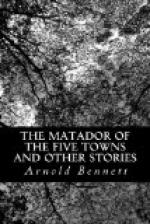“For goodness sake, keep your hands warm,” Mrs Swann enjoined her son.
“Oh!” said Gilbert, with scornful lightness, as though his playing had never suffered from cold hands, “it’s quite warm to-night!” Which it was not.
“And mind what you eat!” added his mother. “There! I can hear the car.”
He hurried up the street. The electric tram slid in thunder down Trafalgar Road, and stopped for him with a jar, and he gingerly climbed into it, practising all precautions on behalf of his violoncello. The car slid away again towards Bursley, making blue sparks. Mrs Swann stared mechanically at the flickering gas in her lobby, and then closed her front door. He was gone! The boy was gone!
Now, the people who considered the boy’s departure to be a dramatic moment in the history of musical enterprise in the Five Towns were Mrs Swann, chiefly, and the boy, secondarily.
II
And more than the moment—the day, nay, the whole week—was dramatic in the history of local musical enterprise.
It had occurred to somebody in Hanbridge, about a year before, that since York, Norwich, Hereford, Gloucester, Birmingham, and even Blackpool had their musical festivals, the Five Towns, too, ought to have its musical festival. The Five Towns possessed a larger population than any of these centres save Birmingham, and it was notorious for its love of music. Choirs from the Five Towns had gone to all sorts of places—such as Brecknock, Aberystwyth, the Crystal Palace, and even a place called Hull—and had come back with first prizes—cups and banners—for the singing of choruses and part-songs. There were three (or at least two and a half) rival choirs in Hanbridge alone. Then also the brass band contests were famously attended. In the Five Towns the number of cornet players is scarcely exceeded by the number of public-houses. Hence the feeling, born and fanned into lustiness at Hanbridge, that the Five Towns owed it to its self-respect to have a Musical Festival like the rest of the world! Men who had never heard of Wagner, men who could not




